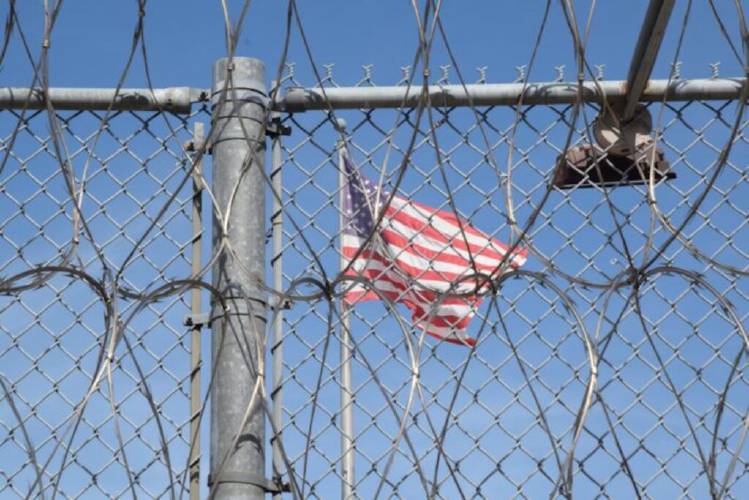Veterans court would resolve charges with treatment instead of prosecution
| Published: 02-26-2024 2:23 PM |
More of New Hampshire’s 94,000 veterans with behavioral health challenges would be able to resolve criminal charges through treatment under a bill getting broad support from lawmakers.
House Bill 1589 has been endorsed by the state Department of Military Affairs and Veterans Services and includes funding for counties that incur expenses, such as providing mental health or substance use disorder treatment. The bill would require each county to offer veterans a treatment option as an alternative to the traditional court process for veterans and active military members.
It passed the House on a voice vote and is now before the House Finance Committee for a second look because it includes state spending.
Rep. Michael Moffett, a Loudon Republican who served 25 years in the Marines, sponsored the bill after hearing about similar programs in other states.
“Someone who joins the military and sacrifices their personal sovereignty for their country’s greater good does rate, in my view, some unique attention when they are broken during their service to their country,” Moffett told the House Judiciary Committee during the bill’s public hearing. “And this is not to excuse criminal behavior at all. But unique sentencing options, through a veterans court, that limit or reduce incarceration could have its value.”
According to the U.S. Department of Veterans Affairs, more than half of justice-involved veterans have mental health problems or substance-abuse disorders.
In 2021, the U.S. Department of Justice released the findings of a 2016 survey that estimated 107,400 veterans were in federal and state prisons, including local jails. Of the 1,869 veteran offenders sentenced in fiscal year 2019, more than 1 in 5 had participated in a combat operation, the United States Sentencing Commission reported in 2021.
Within the state corrections system, 155 inmates report having served in the military, about 8 percent of the population, said Department of Corrections spokesperson Jane Graham.
Article continues after...
Yesterday's Most Read Articles
 Opinion: Public school standards overhaul will impact every facet of public education in NH
Opinion: Public school standards overhaul will impact every facet of public education in NH
 With new plan for multi-language learners, Concord School District shifts support for New American students
With new plan for multi-language learners, Concord School District shifts support for New American students
 With Concord down to one movie theater, is there a future to cinema-going?
With Concord down to one movie theater, is there a future to cinema-going?
 Opinion: The Concord School Board can restore trust with residents
Opinion: The Concord School Board can restore trust with residents
 Concord man charged felony criminal mischief following vandalism outside NH GOP event
Concord man charged felony criminal mischief following vandalism outside NH GOP event
 Getaway driver in Winnipesaukee hit-and-run arrested
Getaway driver in Winnipesaukee hit-and-run arrested
Since 2014, the state has provided veterans treatment as an alternative to court but only through small programs in three courts, Rockingham County Superior Court and circuit courts in Nashua and Manchester. The participation rate has been low. At the start of the year, nine veterans were enrolled in the Manchester program, while three were in Nashua’s. There are seven active participants in the Rockingham County court.
The bill’s supporters say the limited number of sites and lack of a coordinator have made it difficult to expand the program to more people.
The bill would require a veterans treatment court or track in every county. It would also create a veterans court coordinator to work with stakeholders to design and implement a consistent statewide program that would consider the specific needs of veterans, share resources across the state, and measure outcomes.
Rep. Bob Lynn, a Windham Republican and one of the bill’s co-sponsors, said the goal is to ensure more military members have access to the treatment alternative, geographically and via a more formal referral process.
“This is an opportunity to get it everywhere,” he said. “Having a coordinator for this program, I think, would go a long way to (achieving) that.”
Veterans treatment courts, which number over 400 in the country, are similar to mental health and drug courts. Participants must check in with a judge regularly to confirm they are complying with their treatment plan but also to get support and guidance if they are struggling.
The program would have to integrate alcohol and drug treatment and mental health services. Participants would also be drug tested frequently, according to the bill.
Felony- and misdemeanor-level offenses would be eligible. It would be open to military members who’ve experienced service-related sexual trauma, brain injury, psychological disorder, or substance use disorder.
Military members who complete the court-ordered treatment program could avoid charges; have their charges dropped; get probation or a suspended sentence instead of incarceration; or serve a shorter time behind bars, under the bill.
They could also apply to have their charges annulled a year later, under the bill.
Kevin Grady of the State Veterans Advisory Committee said the legislation would benefit veterans’ families, too.
“Our motto is when one of us serves, all of us serve,” he told the House Judiciary Committee. “So if you incarcerate somebody who has an issue, … when they get out that issue hasn’t been solved. And this is an attempt to bring together all the resources to solve the problem at the lowest level.”
Counties could apply for matching grants, ranging from $100,000 to $245,000 depending on the size of the county, for its expenses, such as treatment programs. Counties would be required to seek federal funding first.
Warren Perry, deputy adjutant general at the Department of Military Affairs and Veterans Services, said the treatment court alternative has been shown to reduce recidivism, and thereby costs to the state and counties.
“Veterans would be held accountable to complete these programs,” he told the House Judiciary Committee. “And if they don’t complete the programs, then their alternative sentencing goes away and they end up being sentenced.”




 Charities will not have to pay rent to casinos under new law
Charities will not have to pay rent to casinos under new law Sununu says he’ll support Trump even if he’s convicted
Sununu says he’ll support Trump even if he’s convicted NH mayors want more help from state on homelessness prevention funds
NH mayors want more help from state on homelessness prevention funds Two democrats with parallel views run for same State Senate seat
Two democrats with parallel views run for same State Senate seat
